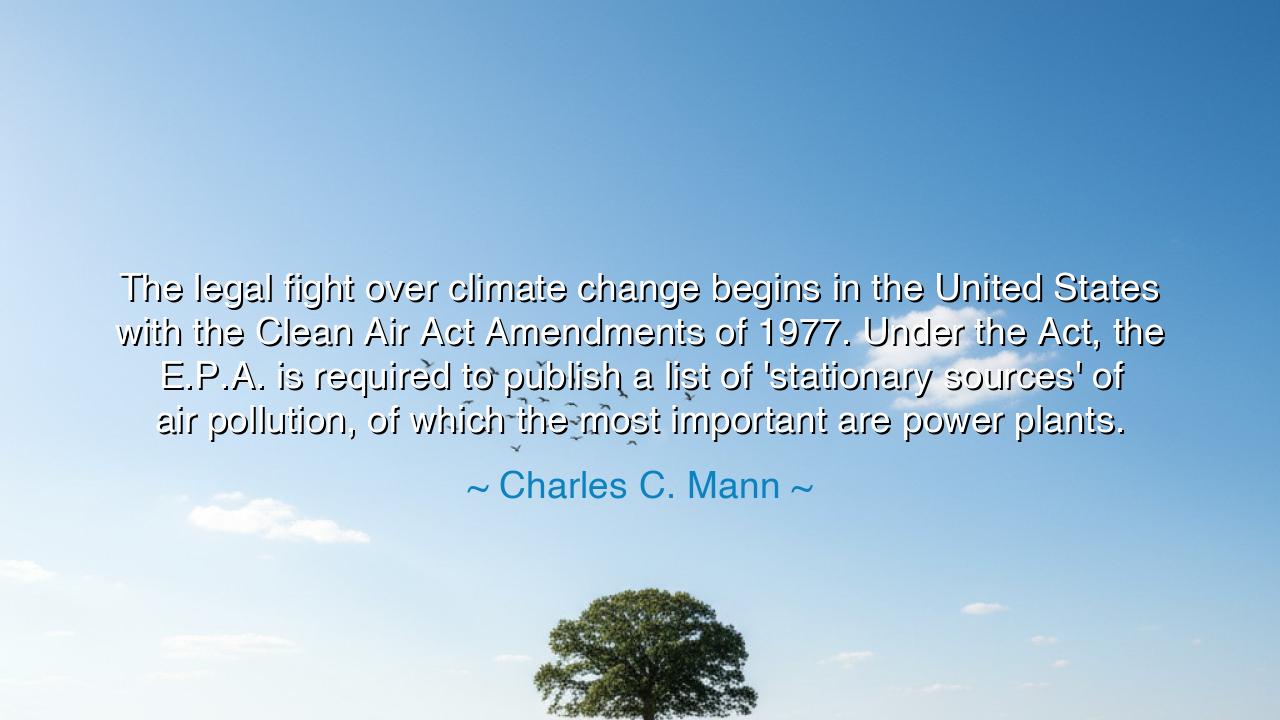
The legal fight over climate change begins in the United States
The legal fight over climate change begins in the United States with the Clean Air Act Amendments of 1977. Under the Act, the E.P.A. is required to publish a list of 'stationary sources' of air pollution, of which the most important are power plants.






The words of Charles C. Mann, “The legal fight over climate change begins in the United States with the Clean Air Act Amendments of 1977. Under the Act, the E.P.A. is required to publish a list of ‘stationary sources’ of air pollution, of which the most important are power plants,” speak not only of law, but of awakening — the awakening of a nation’s conscience to the breath of the Earth itself. In these words lies the story of humanity’s first great reckoning with the invisible forces of its own making: the smoke that veils the sun, the poison that lingers in the air, and the slow erosion of the world’s ancient balance. The Clean Air Act stands as a monument to this awakening — a declaration that even the mightiest power of humankind must bow before the laws of nature.
Before this turning point, the world slumbered in the illusion of endless growth. The chimneys of industry were seen as towers of progress, their smoke as the incense of prosperity. But beneath that smoke, the skies darkened and the lungs of children filled with sickness. Rivers carried the ashes of machines, and forests bowed beneath a sky that no longer wept clean rain. It was then, in the midst of this gathering storm, that voices rose — scientists, citizens, and leaders who declared that the Earth itself was speaking, and that silence would be a crime. Thus was born the struggle that Mann calls the “legal fight over climate change,” a battle fought not with swords or armies, but with laws, with reason, and with courage.
The Clean Air Act Amendments of 1977 marked the first great stand of civilization against its own excess. It called upon the Environmental Protection Agency (E.P.A.) to name and restrain the “stationary sources” — the fixed giants of pollution: power plants, factories, and refineries that had fed the fires of progress while choking the sky. It was an act both humble and heroic, for it sought to bring accountability to the unseen — to make law a guardian not only of people, but of the very air they breathe. In this moment, law reached beyond human quarrels and became the defender of creation itself.
Consider the story of Donora, Pennsylvania, in 1948 — a small town shrouded for days in a deadly fog of industrial fumes. When the mist finally lifted, twenty people were dead, and thousands left gasping for breath. That tragedy, forgotten by many, was one of the sparks that ignited the movement toward clean air. The suffering of Donora became a whisper carried through generations until it found its echo in the Clean Air Act. From death came duty, and from duty, law. Thus, the story of Donora stands as a warning carved in smoke — that progress without conscience becomes poison, and that justice must extend to the air, the water, and the soil.
But even as laws were written and victories won, the battle did not end. The legal fight over climate change continues, for the forces that drive pollution are vast and unyielding — greed, neglect, and the hunger for unending power. The words of Charles C. Mann remind us that this struggle is not just political, but spiritual. It is the eternal contest between creation and consumption, between stewardship and exploitation. Each generation must choose whether to honor the covenant with the Earth or to break it in pursuit of fleeting gain.
And yet, hope endures. The air grows cleaner where courage is strong. New minds invent, new leaders legislate, and new hearts awaken to their responsibility. The law may have begun the fight, but the spirit of humanity must finish it — not in courts alone, but in daily life, in the choices each person makes: how they consume, how they conserve, how they care. The Earth does not belong to us; we belong to it. And so, every act of protection, however small, becomes a prayer in defense of the living world.
Let this teaching be passed on as wisdom to the generations yet unborn: Guard the air, for it is the breath of all that lives. Guard the Earth, for it is your home and your heritage. Guard the law, for it is the shield of your conscience. Do not turn away from the fight because it is long; do not despair because the enemy is invisible. The war for clean air and a stable climate is the war for life itself. Take part in it — through study, through action, through reverence. For when you stand in defense of the Earth, you stand beside all who have ever loved it, and all who ever will.






AAdministratorAdministrator
Welcome, honored guests. Please leave a comment, we will respond soon